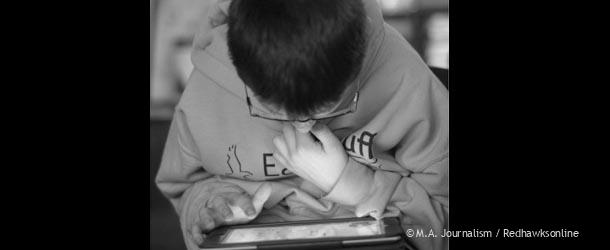Have you ever texted someone who was in a different room, just to ask him or her to get you something or simply just to ask him or her a question, so you didn’t have to get up? On homework assignments, have you ever tried to find an answer quickly on the internet by searching it on Google and getting an answer from a non-reliable site such as Wikipedia?
Do you find yourself having a panic attack when you suddenly misplace your cell phone or other device? If you answered yes to any of those questions you may be one of the many people who suffer from an addiction to technology.
“I hate it (technology) but, I still love it,” said Freshman Yaphet May, “like, I love the stuff that’s on it. But I hate that it’s so addicting and takes up so much time. It’s so tempting.”
The younger generations have a serious disadvantage compared to older generations in regard to technology. They have been surrounded by smartboards, computers, and cell phones, their whole lives; their parents and grandparents were introduced to those methods of technology only after they had learned to do things without.
How is this a disadvantage? Simple. Because after being overwhelmed with technological advances, there is no back-up plan when something goes wrong with the technology. In addition, the same technology that was created to make lives easier has done its job too well, and has made laziness more prominent.
“It’s fast, it saves time with like looking stuff up and it’s good communication. And it’s good for like fast communication like texting like if you need to find out something really fast.” Sophomore Sarah Pope commented. “It takes up too much time—even though it saves time, you wanna use more time on it. And there can be miscommunications through technology since it’s not talking face-to-face.”
Children no longer go and play outside because they stay inside playing with their iPods, iPads, or Xboxes.
Communication skills are lacking because face-to-face meeting is becoming more rare and many now choose to begin and end relationships via text rather than have an actual conversation. Sometimes they can neglect to write down their homework assignments, because they think hey, we can look online, right?
According to NBCnews.com, in the year 2000, just 5% of teens had cell phones. Today one in three teens send more than 100 text messages a day, adding up to 3,000 text messages a month reported pewinternet.org.
Not only are there more cell phones in the hands of teenagers, but the ability of the cell phones has changed considerably as well, allowing people to do anything from playing a game, to attending a meeting by phone, to turning lights on at home all by a simple device that fits in a pocket.
Clearly, technology has made lives easier, but, as illustrated by these examples people now rely on it too much, the effect: increased laziness. May agrees.
“In countries where they don’t have any technology, and they just work hard and get stuff done. So, I could see how ours could be a lazy society.”
Furthermore, technology has altered the human thought process, work ethic, and relationships. Look no further than the use of calculators to illustrate this point. Now, calculators are no big technological advance, but the way they are used illustrates a reliance on technology.
Thirty years ago, calculators were used to check answers; today, many students can’t even find the answers without calculators. Standardized testing like the ACT even allow for the use of calculators, although “calculators are not needed to do well on the ACT.” Instead of having to take 10-15 minutes to answer a math problem, it takes five minutes with a calculator.
Like anything else, technology has benefits as well as risks. Given that every day are new increases in technology, it is clear that technology isn’t something that is going to go away.
Instead, people should become more diligent in using technology in a responsible manner so it does not take over their lives, ruin their work ethic or ruin their relationships any further.

